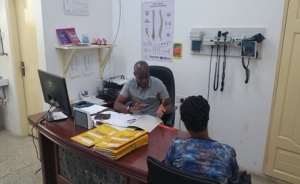 Georgina Aidoo
Georgina Aidoo
Occupational Audiologist
Ghana, West Africa
I have always strived to search for the unique dynamics and realities in Audiology and ultimately discover what makes our patients incomplete without our services and our personal care. I have to face many encumbrances right from the onset of this journey, as being in Africa, and even in West Africa, my developing and third world country has made the trends very challenging, with diverse milestones which all bring learning experiences that are priceless. Pursuing a Doctor of Audiology degree will give me a wide range of opportunities and experiences to develop knowledge, skills and attitudes which will enable me to grow the field and advocate for change.
Challenges
Audiology practice and management of hearing loss and balancing disorders  usually does not command much attention in third world countries, even though various studies and estimates indicate that two-thirds of the world’s populations of hearing impaired people live in the developing countries. In many African countries, the general awareness of Audiology and hearing loss management is low, and lack of resources, ignorance, illiteracy, cultural diversity and national priorities among many other factors relating to technology enhancement and sense of focus has caused a lack of strong advocacy in this area. The Africa continent has a predominantly young population and many are at risk of getting diseases causing hearing loss (McPherson & Holboro, 1985). Overall, it is estimated that in the countries below Sahara, more than 1.2 million children aged between 5 and 14 years suffer from moderate to severe hearing loss in both ears. General prevalence studies show higher rates of severe to profound hearing loss in this part of Africa than in other developing countries.
usually does not command much attention in third world countries, even though various studies and estimates indicate that two-thirds of the world’s populations of hearing impaired people live in the developing countries. In many African countries, the general awareness of Audiology and hearing loss management is low, and lack of resources, ignorance, illiteracy, cultural diversity and national priorities among many other factors relating to technology enhancement and sense of focus has caused a lack of strong advocacy in this area. The Africa continent has a predominantly young population and many are at risk of getting diseases causing hearing loss (McPherson & Holboro, 1985). Overall, it is estimated that in the countries below Sahara, more than 1.2 million children aged between 5 and 14 years suffer from moderate to severe hearing loss in both ears. General prevalence studies show higher rates of severe to profound hearing loss in this part of Africa than in other developing countries.
Hearing problems are a severe handicap, particularly in developing countries where the ability to take part in normal conversations is vital for economic and social survival. However, many are illiterate as well as hearing impaired, and thus unable to communicate by writing and reading. It is difficult to get an exact overview of the prevalence and causes of hearing loss in Africa. Several studies have been conducted but they use different methods and not all are up to date. However, they do serve as indicators and together they provide a general picture of the situation.
 The case of Ghana is no different. In spite of the fact that hearing and balancing disorders are common among persons in communities in Ghana, very few studies have been carried out. The pace of development is very slow despite how critical the need is.
The case of Ghana is no different. In spite of the fact that hearing and balancing disorders are common among persons in communities in Ghana, very few studies have been carried out. The pace of development is very slow despite how critical the need is.
It took an extraordinary effort for me to enroll in an Au.D program after saving for almost a decade all in relation with finding the true purpose my commitment to the field, and I continue to explore and advocate in quest of gaining deep knowledge to help spread Audiology, especially in Ghana and West Africa where silence has swallowed sufferers’ desire to seek help.
Audiology Transformation
I am involved in Community Development, Occupational Health and Environmental Management in a mining environment, and an Audiological setting in hospitals and industrial organizations to offer a comprehensive hearing loss prevention program and promote Occupational Health. During my AuD studies, I identified a very deep gap with the help of my Counseling in Audiology Course, which provided strategies, tools and approaches to help bridge that gap. It might sound exaggerating to say that the entire evolving patient centered care concept being developed is rolled out from the central, core and pivot of our practice, and without this sustainability, our practice will be questionable.
 It is my goal to cause a quality transformation in the field of Audiology in Ghana and beyond using all the truth, practicalities and best practices I have discovered in and around the globe. This I know will be difficult because the demand of health resources in our country is such that advocacy, management and prevention of hearing loss and disorders relating to the ear and balance even among school children takes low priority, let alone adults.
It is my goal to cause a quality transformation in the field of Audiology in Ghana and beyond using all the truth, practicalities and best practices I have discovered in and around the globe. This I know will be difficult because the demand of health resources in our country is such that advocacy, management and prevention of hearing loss and disorders relating to the ear and balance even among school children takes low priority, let alone adults.
I really want a change that will eradicate all stagnant mindset about Audiology Care and how we know how to care for our patients already and bring in minds that are well positioned to embrace a patient-centered approach to audiology care. We will leave no stone unturned and eliminate prejudice and mediocrities that fight against our goal to render services that are patient-centric and team-based.
Finally I will not leave us as clinicians and services providers and professional in Audiology out. We also have our needs and stressors in our homes and environs, and even tough challenges we encounters with our dear patients and how they affect our delivery and how we will manage us to be able to give without measure and not suffer our souls out. In the end we want to reach if possible all wins for all parties involved in the journey.
Reference
McPherson, B.O., & Holboro, C.A. (1985). A study of deafness in West Africa. Journal
of Paediatric Otolaryngology, 10,115-135.
